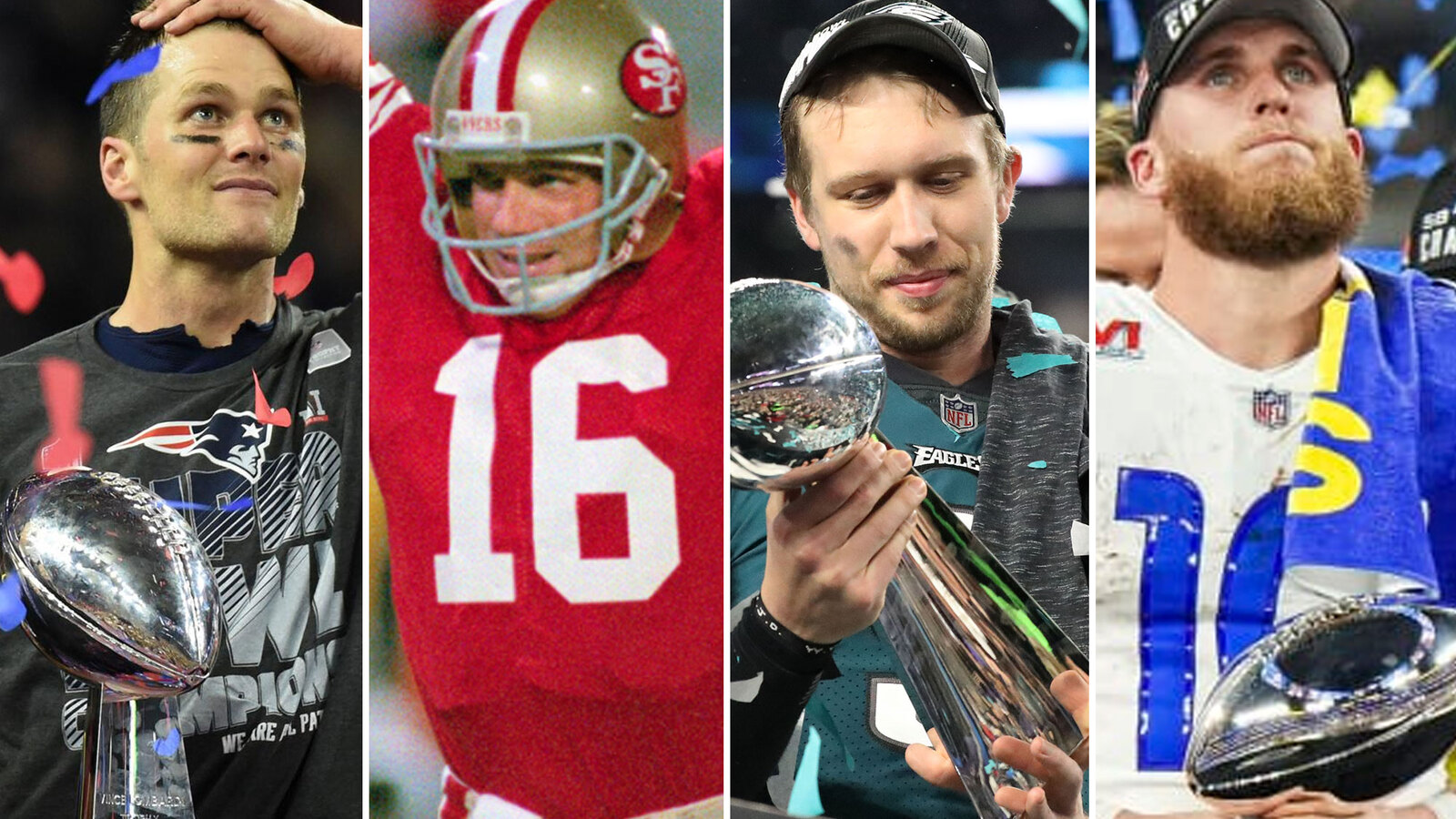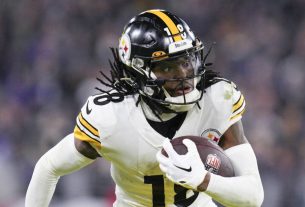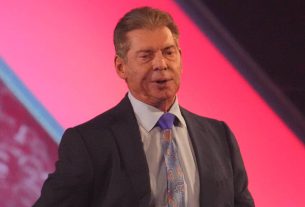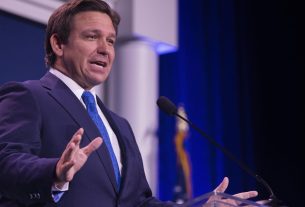Winning a Super Bowl MVP makes a player unforgettable. Here are all 54 performances ranked from worst to best.
1 of 57
Every Super Bowl MVP, ranked
Getty Images
Winning a Super Bowl MVP makes a player unforgettable. Here are all 56 performances ranked from worst to best.
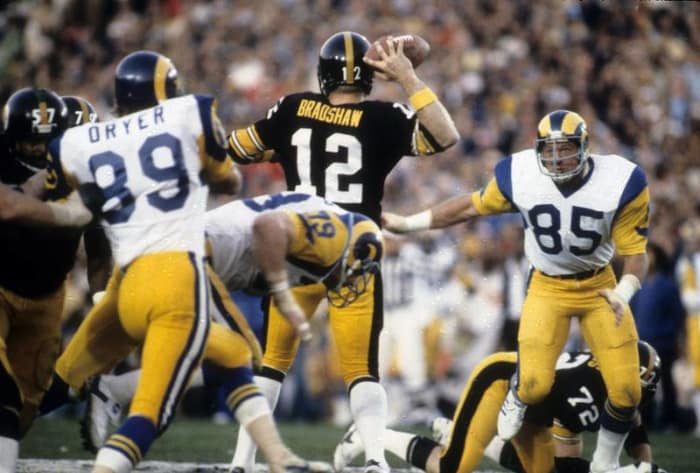
Focus On Sport/Getty Images
Terry Bradshaw’s Super Bowl XIV MVP award (the first repeat winner since Bart Starr in Super Bowls I and II) didn’t come easy. Bradshaw tossed three interceptions, becoming the first and only Super Bowl MVP quarterback to throw more interceptions than touchdowns (two).
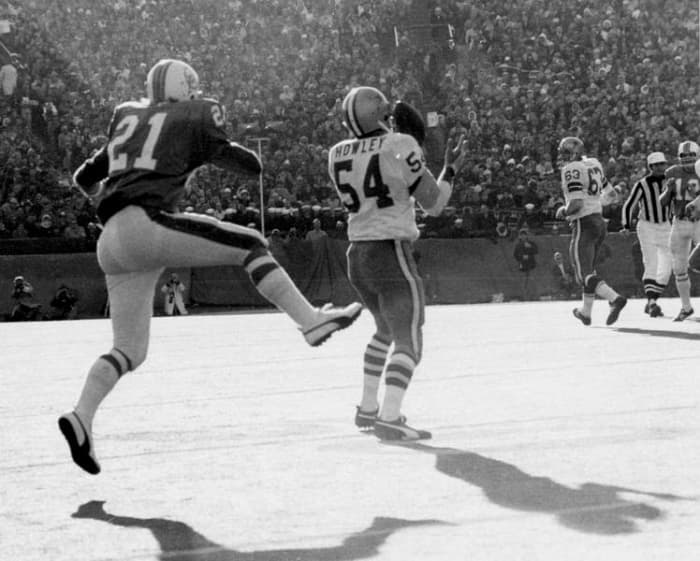
Fred Roe/Getty Images
The so-called “Blunder Bowl” was rife with penalties, turnovers and poor play, as well as a number of officiating errors. So it seems only appropriate that the Super Bowl MVP here was the Cowboys’ Chuck Howley, whose team lost 16–13 to the Baltimore Colts. Howley refused to accept it, citing the meaninglessness of the award due to his team’s loss.
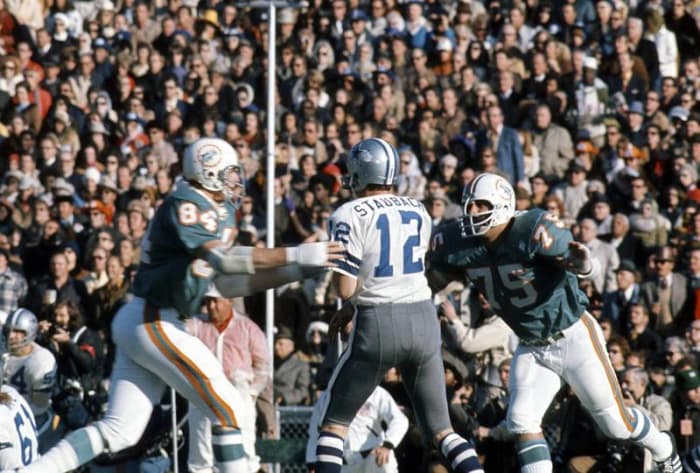
Focus On Sport/Getty Imges
Dallas bounced back from the previous year’s loss to Baltimore thanks to a combination of stellar defensive play and a big day from running back Duane Thomas. Despite his big day (19 rushes, three receptions, 112 total yards and one TD), Thomas was famously cold to the media, which may have led to Cowboys quarterback Roger Staubach earning the MVP award over him.
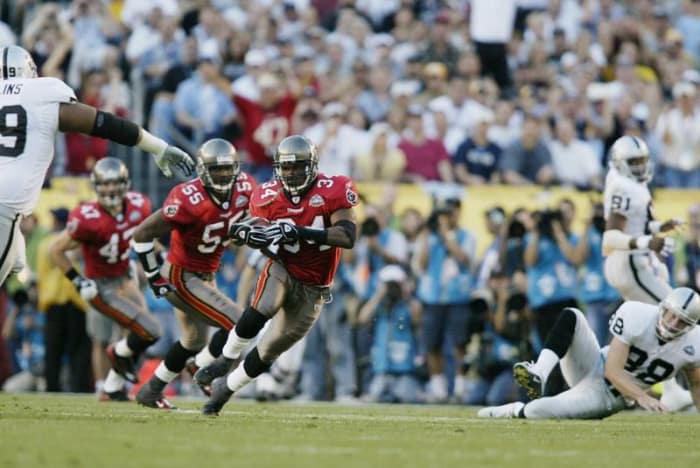
Donald Miralle/Getty Images
Much of the intrigue surrounding Super Bowl XXXVII revolved around Tampa Bay head coach Jon Gruden facing his old team, the Oakland Raiders. The Raiders’ No. 1-ranked offense squared off against the Bucs’ No. 1-ranked defense, but Gruden’s prior knowledge of his old team played a big part in the Bucs’ manhandling of Oakland. The Tampa Bay defense shut down Oakland for the first three quarters of play, with safety Dexter Jackson playing a huge part in forcing Oakland’s Rich Gannon into throwing a Super Bowl-record five interceptions, of which Jackson nabbed two. For his efforts, Jackson became the third defensive back to earn a Super Bowl MVP.
6 of 57
52. Harvey Martin, DE, and Randy White, DT, Dallas Cowboys – Super Bowl XII

Diamond Images/Getty Images
The Cowboys’ “Doomsday Defense” absolutely dominated the Broncos, holding Denver to only eight pass completions for 61 yards and forcing eight turnovers. Voters wanted to elect the entire 11-man defensive unit as MVP, but after the league refused to allow it, they selected defensive linemen Harvey Martin and Randy White to serve as the first and only dual Super Bowl MVPs.
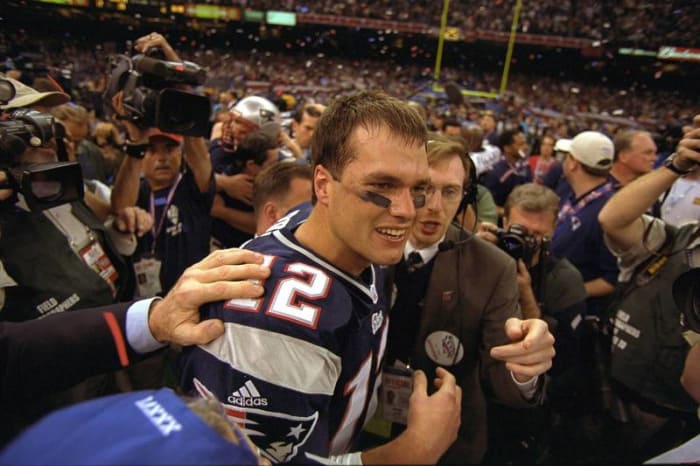
Sporting News Archive via Getty Images
Tom Brady’s emergence as an elite quarterback came about after Patriots starting quarterback Drew Bledsoe went down to injury. Brady had thrown only three passes in his rookie year but led the Pats to an 11–5 record and through the AFC playoffs, most (in)famously in the “Tuck Rule game” against Oakland in the Divisional Round. Kurt Warner‘s St. Louis Rams had dominated most offensive statistical categories and did the same in the Super Bowl, though Brady came through in the final 1:30 of regulation, driving the Pats 53 yards down the field without timeouts to set up an Adam Vinatieri, game-winning field goal. He finished the game with only 145 yards passing and one touchdown.

Lutz Bongarts/Getty Images
To date, the first and only special teams player to ever win Super Bowl MVP, Desmond Howard, set a then-record for longest return, taking a second-half kickoff for a 99-yard touchdown. Howard’s electrifying performance included 154 kickoff return yards, plus 90 punt return yards, tying records for both total return yards and total yards gained (244).
9 of 57
49. Fred Biletnikoff, WR, Oakland Raiders – Super Bowl XI

Diamond Images/Getty Images
Fred Biletnikoff’s Super Bowl MVP performance is unique among those wide receivers who earned the honor. Despite not putting up 100-plus yards receiving or a touchdown, the Raiders receiver’s four catches for 79 yards helped set up three Oakland touchdowns en route to a 32–14 beatdown of the Vikings.

Mitchell Reibel/Getty Images
The Ravens brought a Super Bowl title back to Baltimore for the first time in 30 years, when the Colts still represented the city. Their 34–7 drubbing of the Giants was a defensive showcase, and no player better represented this dominance than linebacker Ray Lewis. Lewis, the regular-season Defensive Player of the Year, captained a Ravens defense that held New York to only 152 total offensive yards, making a number of key tackles and blocking four passes to earn the first Super Bowl MVP award for a defensive player since Larry Brown five years prior.
11 of 57
47. Julian Edelman, WR, New England Patriots – Super Bowl LIII

Christopher Hanewinckel / USA Today Sports Images
Edelman was the offensive star in a game without much offense. He led the Patriots with 10 catches for 141 yards in a 13-3 win over the Rams. LA couldn’t find an answer for Edelman, who was on the receiving end of more than half of Tom Brady’s passing yards.
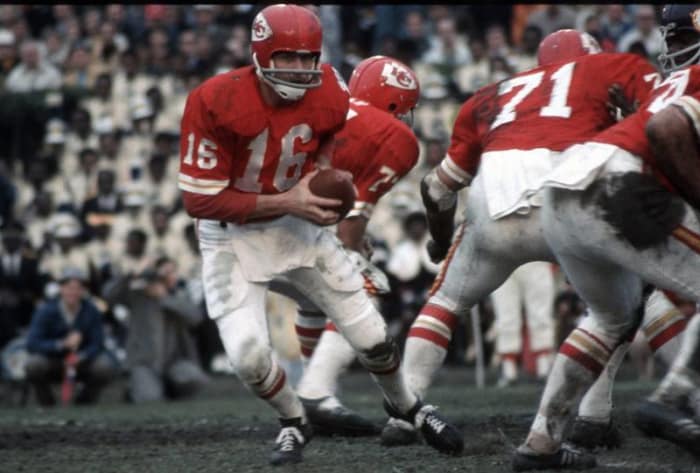
Focus On Sport/Getty Images
Len Dawson, making his second Super Bowl appearance after the Chiefs’ loss in Super Bowl I, wasn’t daunted by the heavily favored Vikings, who crumbled against a mighty K.C. defense. Dawson’s 153 total yards and one TD were enough to earn him MVP honors, marking the fourth consecutive Super Bowl MVP award for a quarterback.
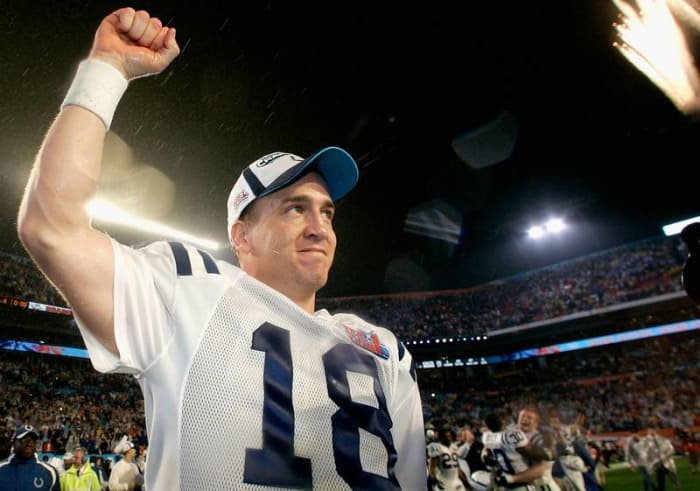
Donald Miralle/Getty Images
Peyton Manning’s first Super Bowl win also earned him MVP honors after he posted a 247-yard, one-touchdown game against the Chicago Bears. Manning’s game, while fairly solid for a quarterback of his stature, was all the more impressive considering Super Bowl XLI was the first Super Bowl to be played in continuous rain.
14 of 57
44. Bart Starr, QB, Green Bay Packers – Super Bowl II
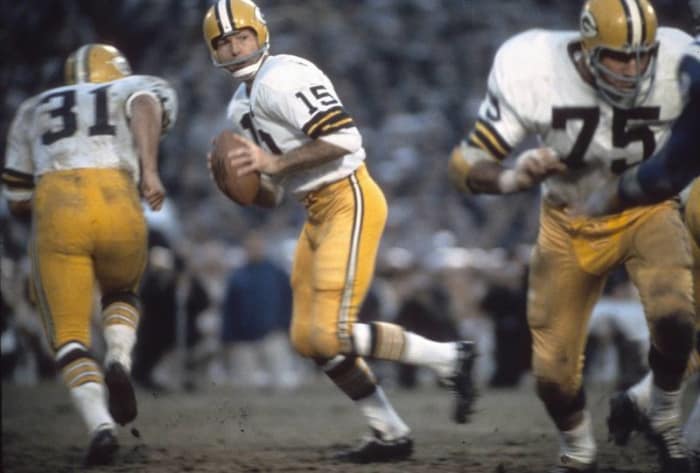
Focus On Sport/Getty Images
The heavily favored Packers earned back-to-back Super Bowl (or AFL-NFL World Championship, as it was still called) trips, dominating the overmatched Raiders 33-14. Starr again got the nod for MVP with a 202-yard, one-touchdown performance, also becoming the first player to earn more than one Super Bowl MVP award.
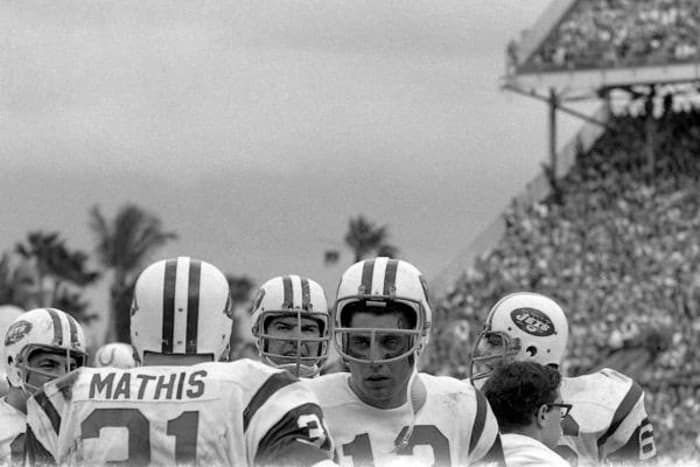
Fred Roe/Getty Images
The general public (and Las Vegas) didn’t give the Jets a chance to defeat the Colts in the first championship game to bear the name “Super Bowl,” but Joe Namath’s brash guarantee of victory earned him pro football legendary status. Namath won MVP honors despite not throwing a single touchdown, or even a single pass in the fourth quarter. Despite only throwing for 206 yards in the 16-7 win, Namath gets credit for coming through on his guarantee.
16 of 57
42. Franco Harris, RB, Pittsburgh Steelers – Super Bowl IX
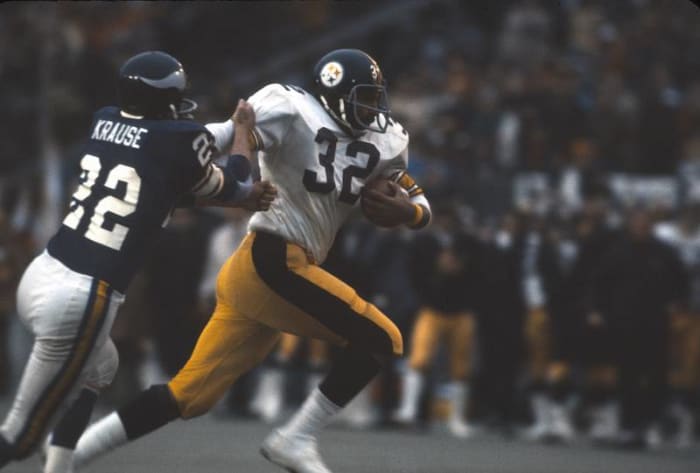
Focus On Sport/Getty Images
Franco Harris carried much of the offensive workload for the Steelers throughout the 1974 season as Terry Bradshaw developed, and as the team advanced to its first Super Bowl, it was clear that Harris would be called upon to do the same for the championship. He didn’t disappoint, running for 158 yards (more than the entire Minnesota offense) and a touchdown, earning the MVP award.
17 of 57
41. Bart Starr, QB, Green Bay Packers – Super Bowl I

James Flores/Getty Images
In the inaugural AFL-NFL World Championship Game (later retroactively named Super Bowl I), Packers quarterback Bart Starr led Green Bay to a win over the Chiefs, despite the AFL team gaining more total yards and first downs. However, Starr played better than his opposing QB, Len Dawson (211 yards, one TD), throwing for a total 250 yards and two touchdowns.
18 of 57
40. Tom Brady, QB, Tampa Bay Buccaneers – Super Bowl LV
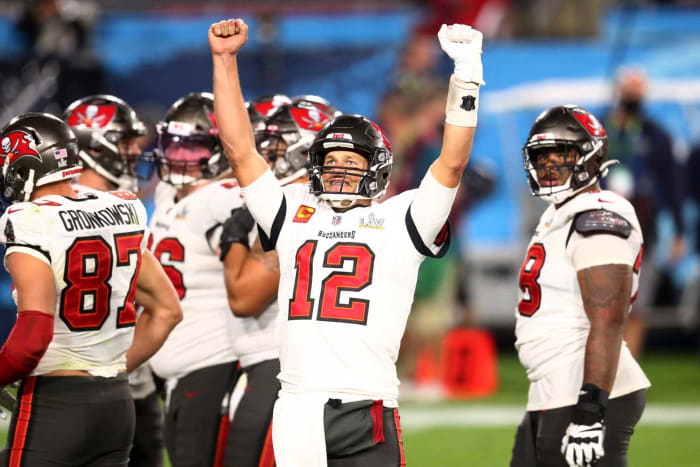
Mark J. Rebilas / USA Today Sports Images
Brady had his way with the Chiefs defense to win his fifth Super Bowl MVP in a 31-9 win. At age 43, he completed 21-of-29 passes for 201 yards and three scores. Still, it was Tampa’s defense that made all the difference in halting the acclaimed Chiefs offense.
19 of 57
39. Patrick Mahomes, QB, Kansas City Chiefs – Super Bowl LIV
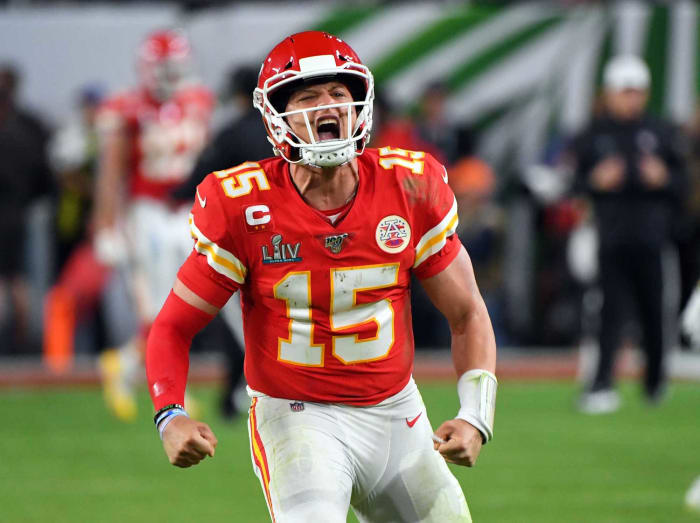
Robert Deutsch / USA Today Sports Images
Mahomes didn’t have his A-game against a great 49ers defense, but helped architect a fourth quarter comeback from a 10-point deficit to win 31-20. He finished the game completing 26-of-42 passes for 286 yards and two touchdowns.
20 of 57
38. Mark Rypien, QB, Washington – Super Bowl XXVI
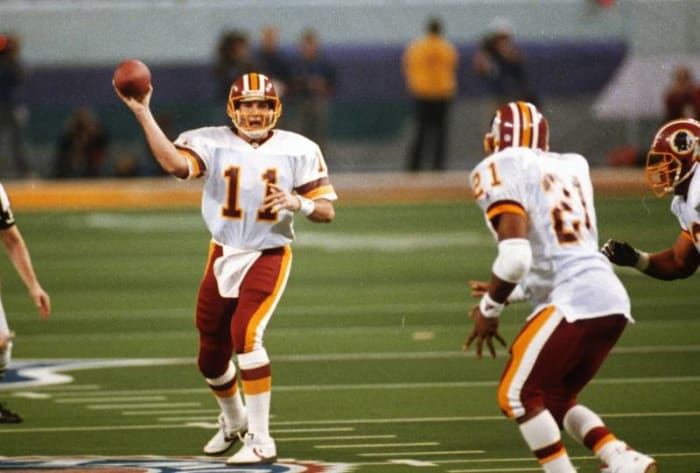
Focus On Sport/Getty Images
Washington’s Gary Clark and Art Monk became the third pair of teammates to have 100-plus receiving yards in a Super Bowl, but the man who delivered those throws earned the honors. Mark Rypien became the third Washington quarterback to win a Super Bowl and the second to win the MVP, after Doug Williams in Super Bowl XXII. He threw for 292 yards and two touchdowns.

Stephen Dunn/Getty Images
Super Bowl XLVIII marked the second time that the No. 1-ranked offensive team met the No. 1-ranked defensive team (the first being the Raiders-Bucs matchup in Super Bowl XXXVII), with Seattle’s Legion of Boom facing off against Peyton Manning’s record-setting Broncos offense. Much like Bucs-Raiders, this game was completely one-sided, with the Seattle defense stifling Manning and the Broncos, thanks in part to MVP Malcolm Smith, who returned a Manning interception 69 yards for a touchdown, recovered a fumble and recorded nine tackles.
22 of 57
36. Joe Montana, QB, San Francisco 49ers – Super Bowl XVI
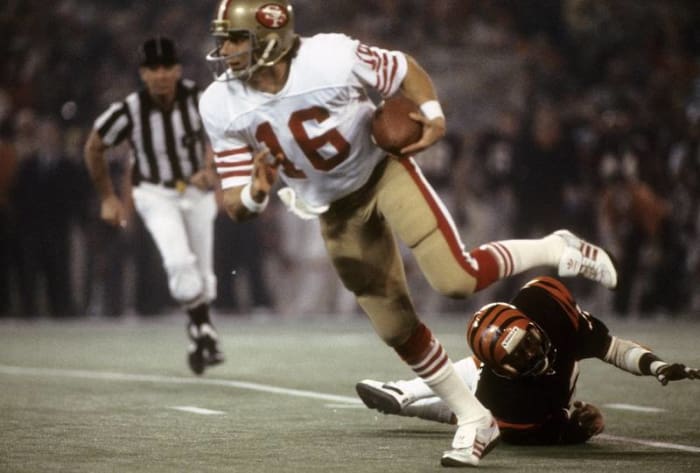
Focus On Sport/Getty Images
The 49ers became the first team to lose the total yards and touchdowns battle in the Super Bowl and still come out on top, thanks in no small part to the arm and legs of Joe Montana. Montana threw for 157 yards and a touchdown, ran for 18 yards and a touchdown and built an insurmountable 20-0 lead by halftime of Super Bowl XVI, earning the first of his record three Super Bowl MVP awards.
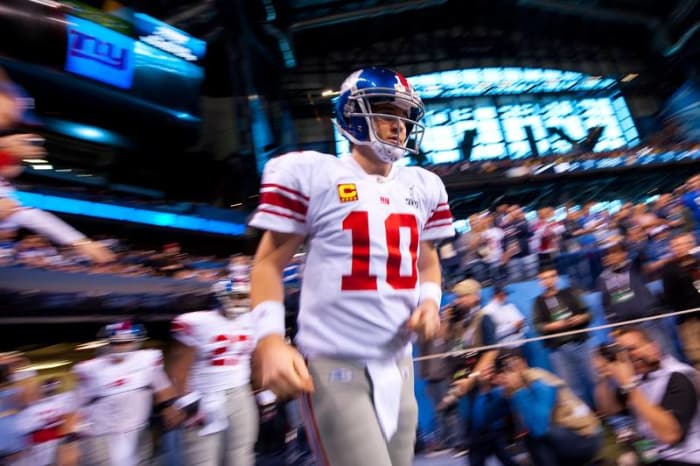
Rob Tringali/Getty Images
Eli Manning earned his reputation as the Patriots’ nemesis after Super Bowl XLII and once again sunk the Patriots’ title hopes for the second time in four years. New England erased a 9-0 deficit by scoring 17 unanswered points in the third quarter, but the Giants closed the gap with a pair of field goals and then a clutch Manning pass to Mario Manningham along the left sideline. The catch helped the Giants score on a rushing touchdown to retake the lead, and the Giants defense held off Tom Brady to allow Eli his second Super Bowl MVP award on a 296-yard, one-touchdown performance.
24 of 57
34. Ottis Anderson, RB, New York Giants – Super Bowl XXV
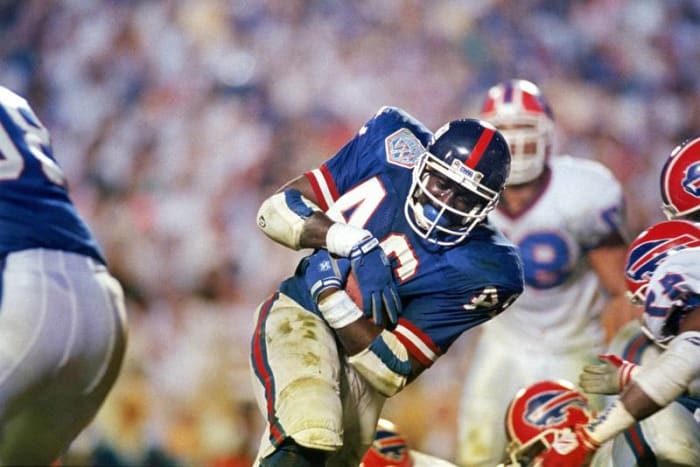
Rogers Photo Archive via Getty Images
The Bill Parcells-led Giants employed a power running game to bulldoze their way to the Super Bowl, facing a Bills team known for its high-powered, fast-paced offense. Big Blue’s run game did its job, however, eating the clock under Anderson’s 102-yard, one-touchdown performance and allowing the Buffalo offense less than 20 minutes on the field.
25 of 57
33. Cooper Kupp, Los Angeles Rams – Super Bowl LVI
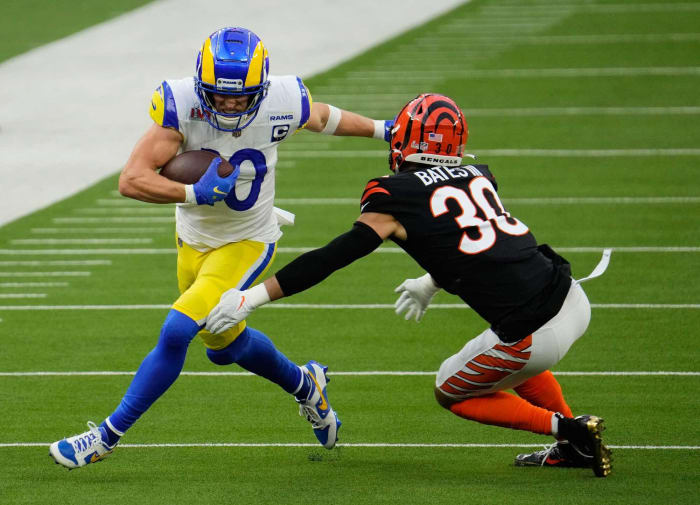
Robert Hanashiro / USA Today Sports Images
Kupp shined for the Rams in Super Bowl LVI as he had all regular season. The wideout caught eight balls for 92 yards and two touchdowns, including the game winner in a 23-20 triumph over Cincinnati.

Allen Kee/Getty Images
Few NFL players can say they’ve gone out on as high a note as John Elway did. After the previous year’s victory over Green Bay, Elway led the Broncos back to the Super Bowl to face the Atlanta Falcons, where his 80-yard touchdown pass to Rod Smith helped spark 17 unanswered points to keep the Broncos on top for the rest of the game. Elway’s Super Bowl XXXIII victory was his last game, as he retired before the 1999 season.
27 of 57
31. Eli Manning, QB, New York Giants – Super Bowl XLII
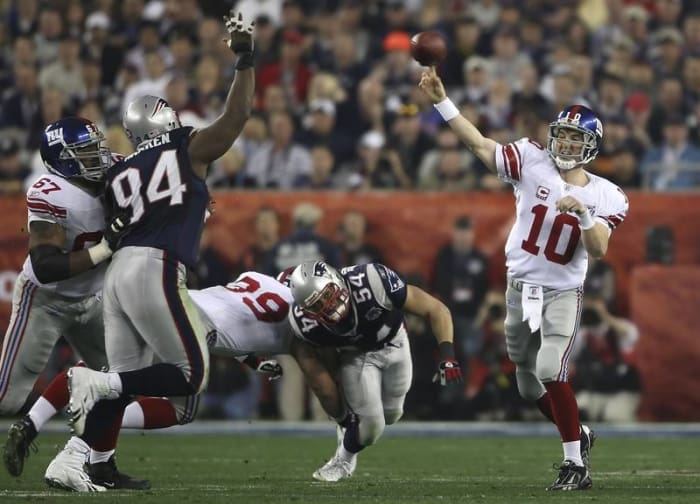
Elsa/Getty Images
Eli Manning followed his brother to Super Bowl MVP glory, though the younger Manning’s route to the award will likely live on forever in NFL legend. After a couple of lead changes in the fourth quarter that left the Patriots up 14–10, Eli famously broke free from three Patriots defenders to hurl a pass that David Tyree brought down in the immortal “Helmet Catch.” The Giants, of course, went on to win on Eli’s touchdown pass to Plaxico Burress, spoiling what would have been a 19-0 season for the heavily favored Patriots. Manning finished with 255 yards and two touchdown passes, doing what seemed impossible.
28 of 57
30. Richard Dent, DE, Chicago Bears – Super Bowl XX
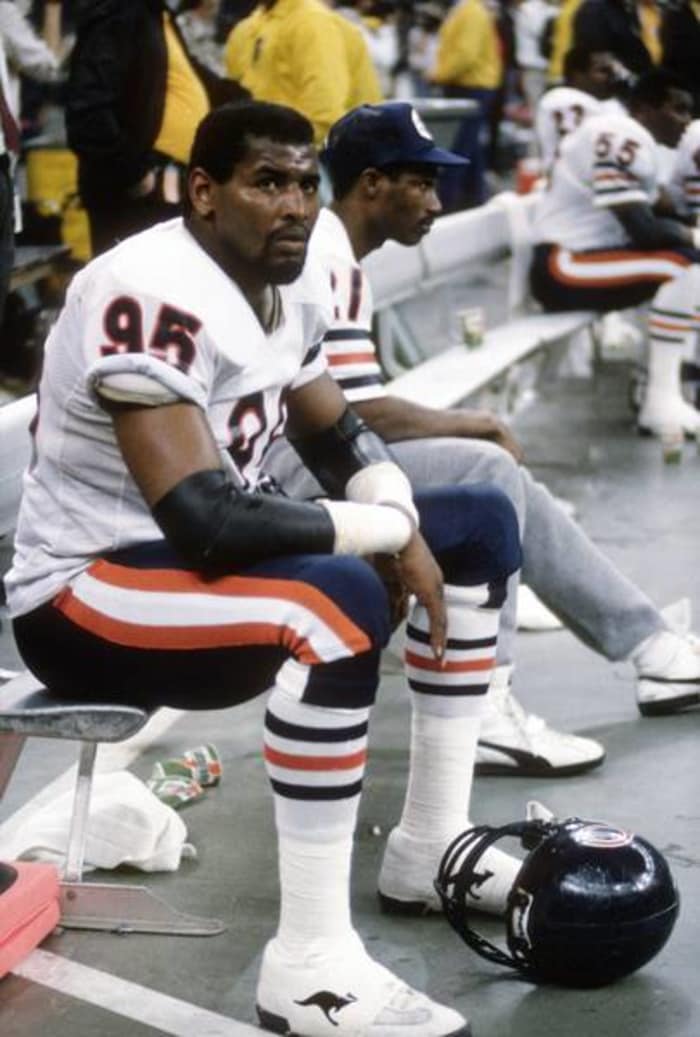
Focus On Sport/Getty Images
The Bears defense entered this contest with a fearsome reputation, and for good reason. The team was atop the league in practically all defensive statistical categories through the regular season. Future Hall of Famer Richard Dent led the charge, posting 1.5 sacks, forcing two fumbles and blocking a pass, as the Bears held the Patriots to only 10 points and set records for sacks (seven) and fewest rushing yards allowed, as well as posting the largest margin of victory.
29 of 57
29. Von Miller, LB, Denver Broncos – Super Bowl 50

Patrick Smith/Getty Images
With one of the most dominant defenses in recent memory, it’s no surprise that a defensive player took home Super Bowl MVP in the Broncos’ 24-10 victory over the Panthers. Von Miller nabbed the honor with his 2.5 sacks and two forced fumbles, both coming on strip sacks. His first led to a touchdown for Denver, and the second strip sack sealed the game, helping send Peyton Manning into the sunset with his second Super Bowl victory.
30 of 57
28. Emmitt Smith, RB, Dallas Cowboys – Super Bowl XXVIII

Focus On Sport/Getty Images
The Bills certainly hoped that their fourth consecutive Super Bowl trip would be the charm, but again, the Cowboys played spoiler. This time, however, Emmitt Smith was the one to torment Buffalo, which blew a lead at the half and allowed Smith to run for 132 yards and two touchdowns.
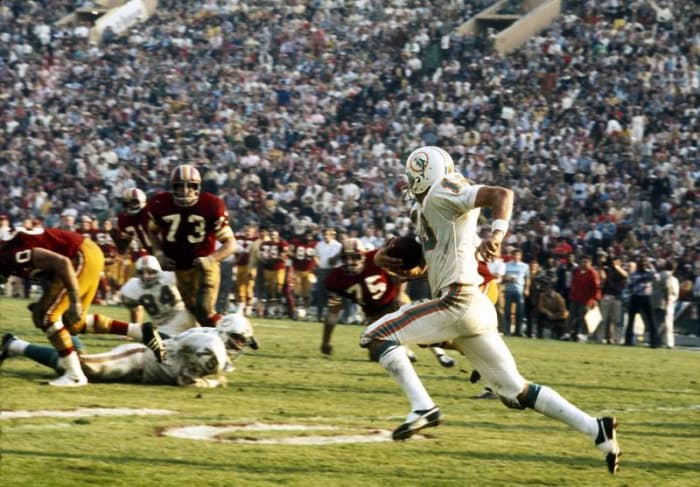
Nate Fine/Getty Images
Super Bowl VII remains the lowest-scoring Super Bowl ever, and appropriately, MVP honors went to a defensive player for the second time ever. Dolphins safety Jake Scott returned two interceptions for 63 total yards, helping keep Washington scoreless until only 2:07 remained in regulation.
32 of 57
26. Larry Brown, CB, Dallas Cowboys – Super Bowl XXX

Al Bello/Getty Images
Despite the presence of future Hall of Famer Rod Woodson on the Steelers, the first cornerback to win Super Bowl MVP was Dallas’ Larry Brown. Brown picked off two of Neil O’Donnell’s passes, including one crucial one that stopped a Steelers drive that could have put them ahead of the Cowboys. Instead, Brown’s interception led to a Troy Aikman-to- Michael Irvin TD that helped put the Cowboys ahead for good.
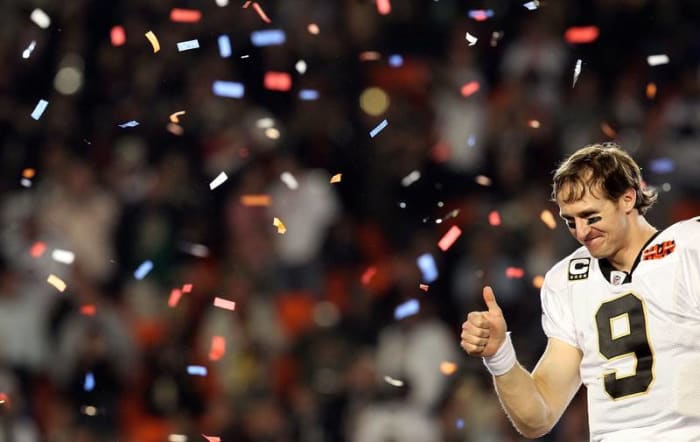
Ronald Martinez/Getty Images
Drew Brees became the darling of New Orleans, which had suffered greatly four years earlier after the devastation of Hurricane Katrina. Brees had an outstanding day against the Colts, tying Tom Brady’s Super Bowl-record 32 completions, to go along with 288 yards and two touchdowns.
34 of 57
24. Hines Ward, WR, Pittsburgh Steelers – Super Bowl XL
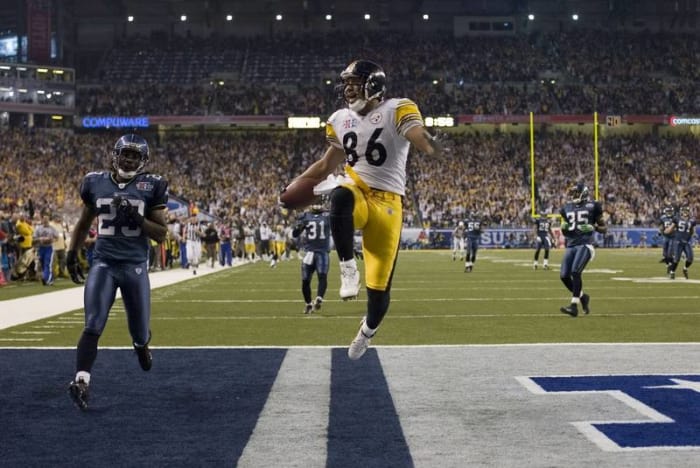
Sporting News Archive via Getty Images
Hines Ward had only a small number of catches in Super Bowl XL (five total), but he made the most of them, posting 123 yards receiving. His biggest play came from an unlikely source: fellow wideout Antwaan Randle El, who threw a 43-yard touchdown pass to Ward, marking the first time a wide receiver threw a touchdown pass in a Super Bowl.
35 of 57
23. Deion Branch, WR, New England Patriots – Super Bowl XXXIX

Jeff Gross/Getty Images
Tom Brady was once again his usual excellent self in the Patriots’ third Super Bowl appearance in four years, but this time around, wide receiver Deion Branch stole the show. Branch put up a big 11-catch, 133-yard day, setting up much of the Patriots’ scoring opportunities and tying the record for most catches, as well as giving him 100-yard performances in back-to-back Super Bowls.
36 of 57
22. Lynn Swann, WR, Pittsburgh Steelers – Super Bowl X

Focus On Sport/Getty Images
Lynn Swann became the first receiver to win the Super Bowl MVP after a Super Bowl-record 161-yard performance, nabbing a 64-yard TD pass in the fourth quarter to help put the trailing Steelers ahead of the Cowboys for good. His clutch play puts him relatively high on the MVP list.
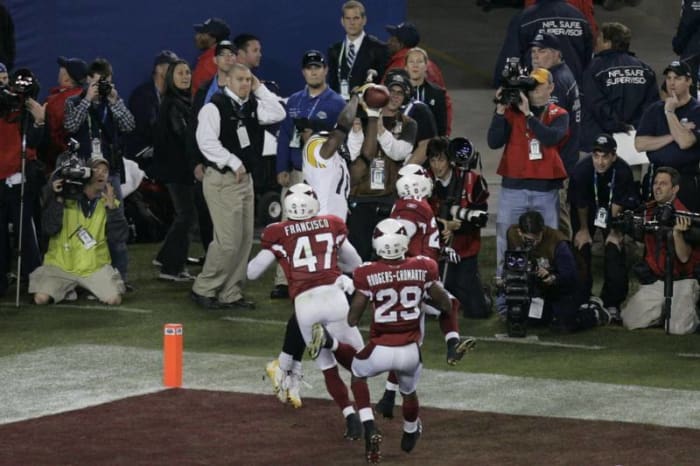
Michael Zagaris/Getty Images
Kurt Warner and Larry Fitzgerald connected twice in the fourth quarter to bring the Cardinals back from a 20-7 deficit, taking a late lead. Ben Roethlisberger and Santonio Holmes had the last laugh, however, connecting on a number of big plays on the final drive, which culminated with a clutch 6-yard touchdown pass to the end zone corner that saw Holmes miraculously keep both feet inbounds and put the Steelers ahead for good. He finished the game with nine receptions for 131 yards, along with the score.
38 of 57
20. Jim Plunkett, QB, Oakland Raiders – Super Bowl XV
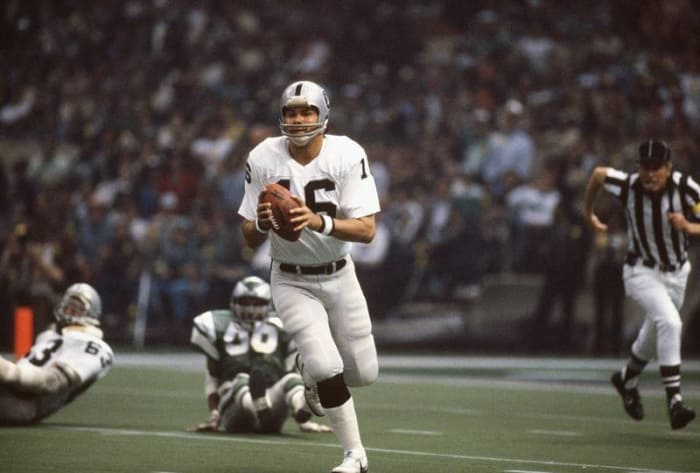
Focus On Sport/Getty Images
Jim Plunkett went from backup quarterback to Super Bowl MVP in the course of a single season. With the Eagles slightly favored to win, Plunkett’s three touchdown passes kept the Raiders solidly ahead of the Eagles throughout the game, making Oakland the first wild-card team to win a Super Bowl.
39 of 57
19. Joe Flacco, QB, Baltimore Ravens – Super Bowl XLVII

Chris Graythen/Getty Images
Joe Flacco followed up his best regular season to date with a blistering playoff performance that saw him take down both Peyton Manning and Tom Brady. He was no less than excellent in his Super Bowl XLVII matchup with San Francisco, throwing for 287 yards and three touchdowns, including a 56-yard bomb to Jacoby Jones. Despite his shortcomings, Flacco’s playoff performance helped to create the perception that he’s near the elite quarterbacks in the game.
40 of 57
18. Larry Csonka, RB, Miami Dolphins – Super Bowl VIII
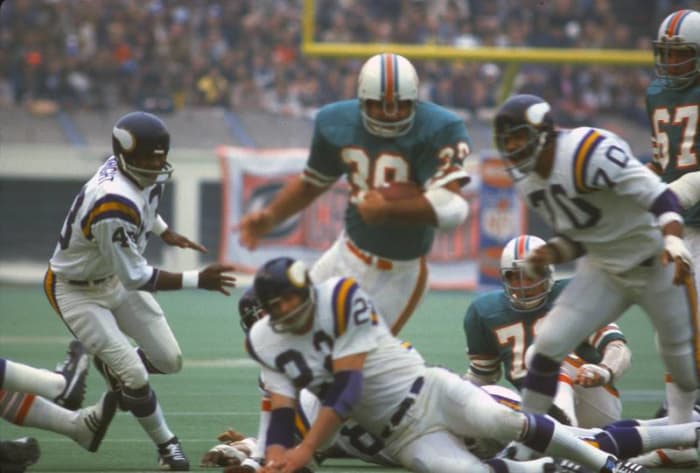
Focus On Sport/Getty Images
The first running back to win Super Bowl MVP, the Dolphins’ Larry Csonka absolutely dominated the Vikings and their vaunted Purple People Eaters, running all over them to the tune of 145 yards and two touchdowns on 33 attempts. Behind Csonka and a strong defense, the game was well over by the time it entered the fourth quarter, with the Dolphins up 24-0 at that point.
41 of 57
17. Marcus Allen, RB, Los Angeles Raiders – Super Bowl XVIII
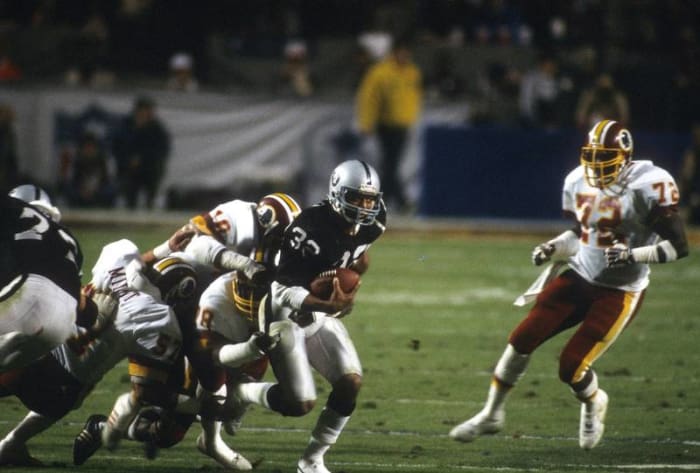
Focus On Sport/Getty Images
The Raiders’ much-feared defense saw Los Angeles bully Washington in Super Bowl XVIII, holding the defending champs to only nine points. But Marcus Allen stole the show, running for a then-record 191 yards and two touchdowns, including a backbreaking 74-yard touchdown run to close the third quarter with the game well in hand for L.A. His performance is often shown in Super Bowl highlights.
42 of 57
16. Terry Bradshaw, QB, Pittsburgh Steelers – Super Bowl XIII
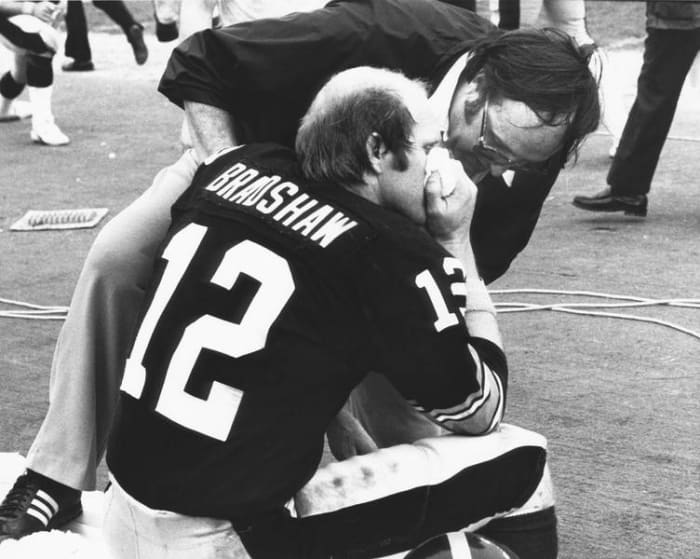
Bill Smith/Getty Images
In a Super Bowl laden with talent on both sides (16 future Hall of Famers), Terry Bradshaw had to be nothing short of amazing to stand out. He was, to the tune of a then-record 318 yards and four touchdown passes, eclipsing his counterpart and former Super Bowl MVP Roger Staubach en route to a thrilling 35-31 victory over the Cowboys.
43 of 57
15. Joe Montana, QB, San Francisco 49ers – Super Bowl XIX
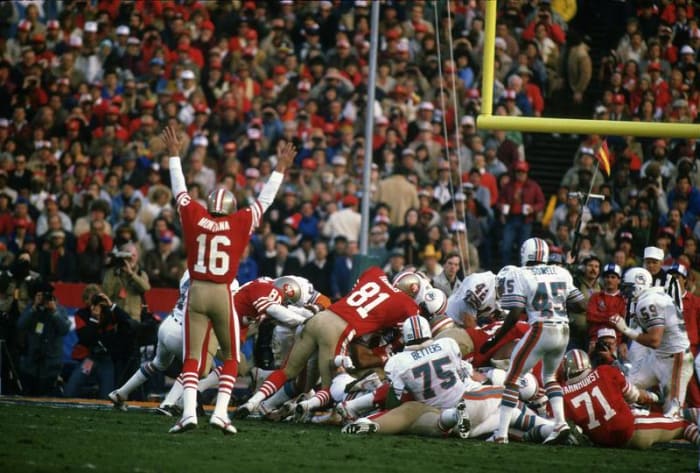
Focus On Sport/Getty Images
This showdown between two quarterback legends, Dan Marino and Joe Montana, was expected to be a shootout for the ages. As it turned out, the Dolphins had no answer for Montana, who outplayed his rival with a 331-yard, three-touchdown performance to earn his second Super Bowl MVP, joining Bart Starr and Terry Bradshaw as the only repeat Super MVP winners to that point.
44 of 57
14. Aaron Rodgers, QB, Green Bay Packers – Super Bowl XLV

Kevin C. Cox/Getty Images
Aaron Rodgers made the most of his only Super Bowl appearance to date, hitting his receivers to the tune of 304 yards on 24 completions and connecting for three touchdowns. Thanks to Rodgers, both Jordy Nelson and Greg Jennings had monster days, Nelson with 140 yards and a touchdown on nine receptions and Jennings picking up 64 yards on four receptions and two touchdowns.
45 of 57
13. Nick Foles, QB, Philadelphia Eagles – Super Bowl LII

John David Mercer / USA Today Sports Images
Foles completed a remarkable playoffs by completing 28-of-43 passes for 373 yards, three touchdowns and one receiving touchdown on the play infamously known as “Philly Special.” Emerging as the Eagles starter late in the year when regular starter Carson Wentz suffered a knee injury, Foles led the franchise to its first-ever Super Bowl win.
46 of 57
12. Troy Aikman, QB, Dallas Cowboys – Super Bowl XXVII
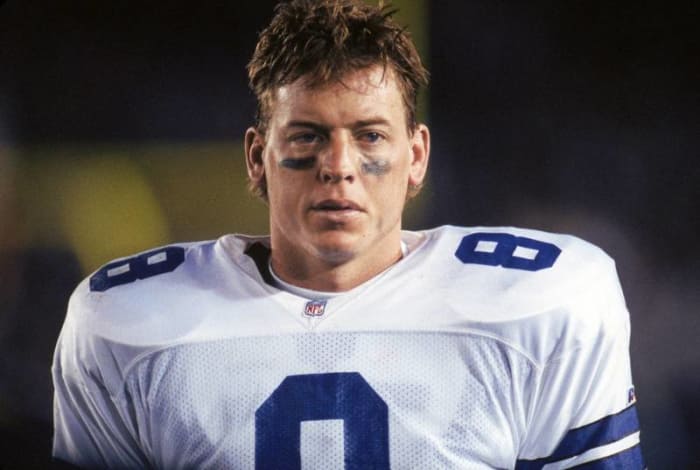
Rogers Photo Archive via Getty Images
The Buffalo Bills entered Super Bowl XXVII having lost back-to-back Super Bowls and were desperate to win in a third consecutive championship opportunity. Unfortunately, this coincided with the resurgence of the Cowboys, who crushed the Bills 52–17 behind Troy Aikman’s 273-yard, four-touchdown MVP performance.
47 of 57
11. Tom Brady, QB, New England Patriots – Super Bowl XXXVIII

Andy Lyons/Getty Images
The Patriots returned to the Super Bowl after a wildly successful 2003 season and again gave NFL fans a thriller, facing the Carolina Panthers in a game that again ended on Adam Vinatieri’s foot. Tom Brady became the first repeat Super Bowl MVP winner since Joe Montana behind a 354-yard, three-touchdown passing day, again setting up Vinatieri for the game-winning field goal with a last-minute drive.
48 of 57
10. Terrell Davis, RB, Denver Broncos – Super Bowl XXXII
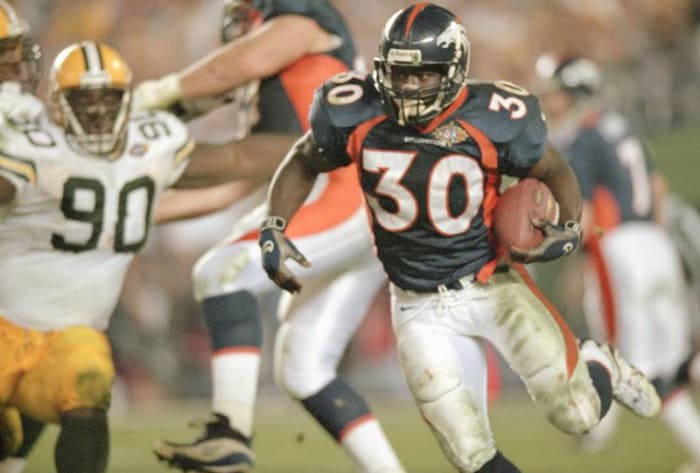
Focus On Sport/Getty Images
Broncos running back Terrell Davis played a huge part in snapping the AFC’s 13-game losing streak in the Super Bowl and leading Denver to its first championship in five tries. Despite suffering a migraine headache that sidelined him for much of the second quarter, Davis rushed for 157 yards and tied a Super Bowl record with three rushing touchdowns.
49 of 57
9. Tom Brady, QB, New England Patriots – Super Bowl XLIX
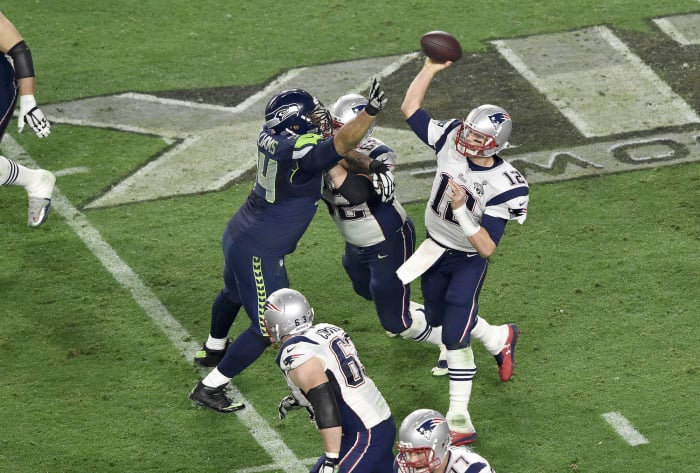
Focus On Sport/Getty Images
This game will always be remembered for Seattle’s curious decision to pass the ball instead of handing it off to Marshawn Lynch with a chance to win, but Tom Brady’s MVP performance should not go unnoticed. In winning his fourth Super Bowl and third SB MVP, Brady threw four touchdowns and put up 328 yards, picking apart the vaunted Seattle defense through the air, including throwing what turned out to be the game-winning touchdown pass to Julian Edelman with just over two minutes left. His third SB MVP tied Joe Montana’s record.
50 of 57
8. Phil Simms, QB, New York Giants – Super Bowl XXI
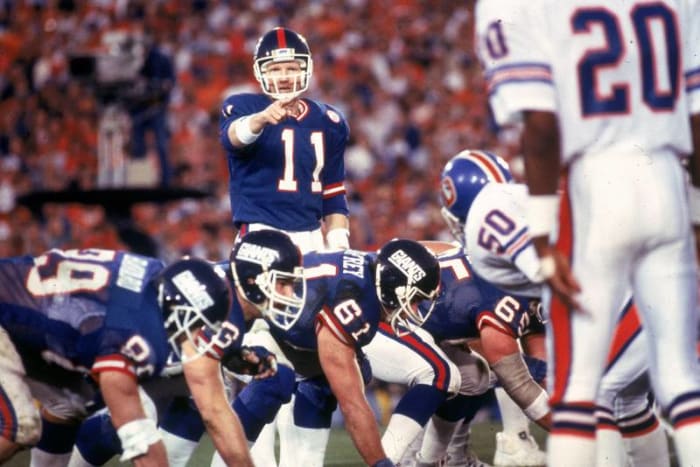
Nate Fine/Getty Images
Phil Simms led the Giants to their first-ever Super Bowl win with a stellar performance, bringing the G-Men back from a first-half deficit by completing 22 of 25 passes for 268 yards and three touchdowns. His 88 percent completion percentage stood as a postseason record for 21 years, until Tom Brady surpassed it with a 92.9 completion percentage in the Patriots’ AFC divisional matchup against Jacksonville in 2007.
51 of 57
7. Kurt Warner, QB, St. Louis Rams – Super Bowl XXXIV
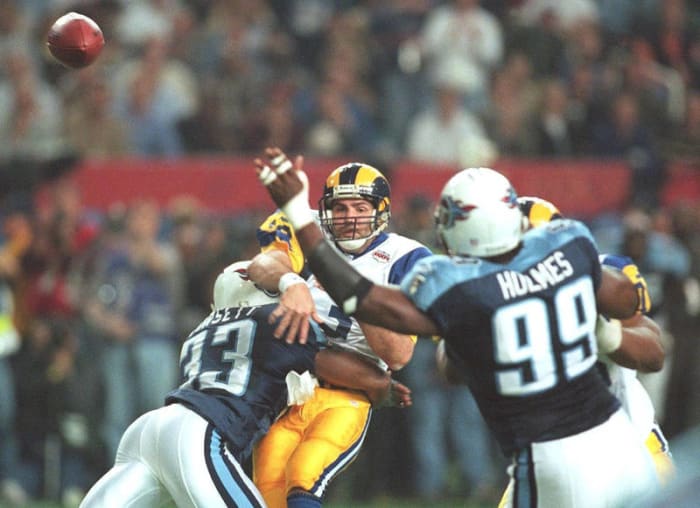
Lutz Bongarts/Getty Images
Kurt Warner’s playoff debut led to one of the greatest Super Bowls ever. After coughing up a 16-0 lead to the Titans in the fourth quarter and allowing Tennessee to tie the game, Warner threw a long pass to Isaac Bruce on the first play of the ensuing drive that led to a 73-yard touchdown, putting the Rams up 23-16. The Titans attempted their valiant drive to tie, only for Kevin Dyson to famously fall one yard short of the tying score. Warner’s 414 passing yards and 45 pass attempts with no interceptions set a Super Bowl record, though Mike Jones’ tackle at the end of the game is what is most often remembered.

Ronald C. Modra/Getty Images
A 33-year-old running back is ancient by today’s standards, so John Riggins’ MVP performance in Super Bowl XVII was and is still remarkable to behold. Despite a so-so campaign during the strike-shortened 1982 season, Riggins lit up the NFC playoffs (444 yards, three TDs in three games). Amazingly he performed even better in the Super Bowl, picking up 166 yards on the ground (for his fourth consecutive 100-yard rushing game, a postseason record) and scoring three times. A 15-yard reception gave him more total yards than the entire Dolphins team.
53 of 57
5. Tom Brady, QB, New England Patriots – Super Bowl LI

Mark J. Rebilas / USA Today Sports Images
Brady helped orchestrate one of the greatest comebacks in football history. Down 28-3 to the Falcons in the third quarter, Brady and the Pats offense went to work. Chipping away at the lead, the Patriots were able to eventually tie the game at 28 in regulation. New England won on a James White touchdown in overtime, 34-28. Brady finished 43-of 62 for 466 yards and two touchdowns, beating out James White and his three scores for the award.
54 of 57
4. Jerry Rice, WR, San Francisco 49ers – Super Bowl XXIII
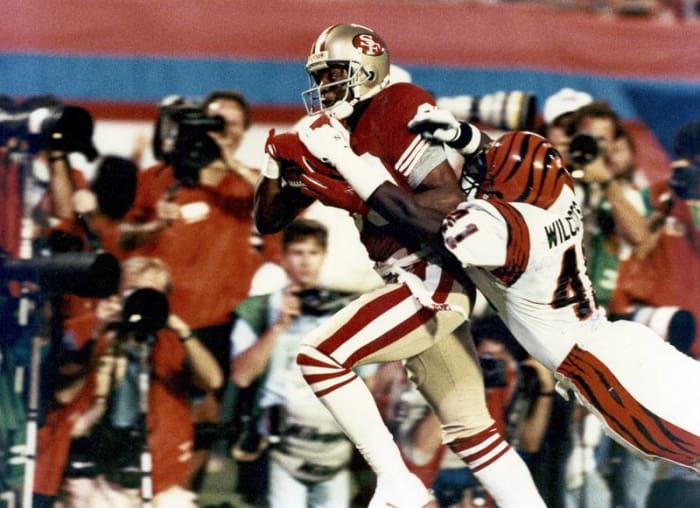
Sylvia Allen/Getty Images
Jerry Rice’s Super Bowl MVP performance was the first for a receiver since Fred Biletnikoff’s, and it was richly deserved. Rice caught 11 passes for 215 yards, a Super Bowl record, and a touchdown to tie the game at 13 against the Bengals in the fourth quarter. Joe Montana, who uttered his immortal, “hey, isn’t that John Candy?” line prior to the game-winning drive, also had himself an MVP-caliber performance, throwing for 357 yards and two touchdowns, the aforementioned Rice TD and the game-winner to John Taylor with 39 seconds to go.
55 of 57
3. Doug Williams, QB, Washington – Super Bowl XXII

Rick Stewart/Getty Images
Doug Williams entered Super Bowl XXII with the spotlight thrust upon him as the first African-American quarterback to start in a Super Bowl. Originally Washington’s backup at the beginning of the 1987 season, Williams was promoted and led the team to two playoff victories to earn a date against Denver in the Super Bowl. After trailing 10-0 in the first quarter, Williams led Washington back with 42 unanswered points, throwing for four touchdowns and 340 yards, both Super Bowl records, and earning a well-deserved MVP nod.
56 of 57
2. Joe Montana, QB, San Francisco 49ers – Super Bowl XXIV
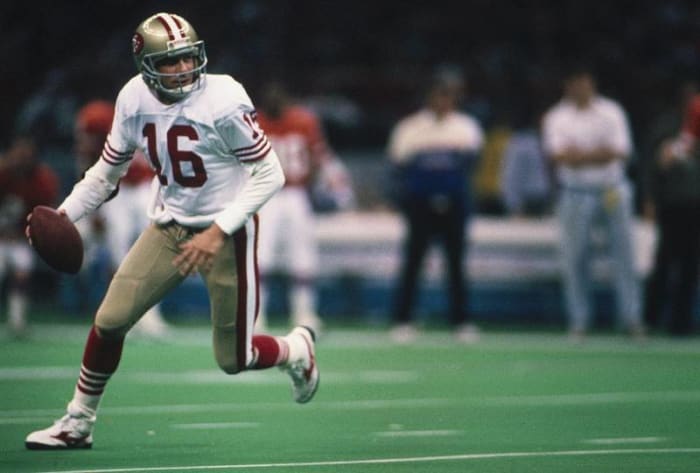
Focus On Sport/Getty Images
In his final Super Bowl appearance, Joe Montana delivered a legendary performance in a 55–10 rout of the Denver Broncos, the largest margin of victory ever in a Super Bowl. Joe Cool passed for 297 yards on 22 completions (in 29 attempts) and a Super Bowl-record five touchdowns, earning his third and final Super Bowl MVP award.
57 of 57
1. Steve Young, QB, San Francisco 49ers – Super Bowl XXIX
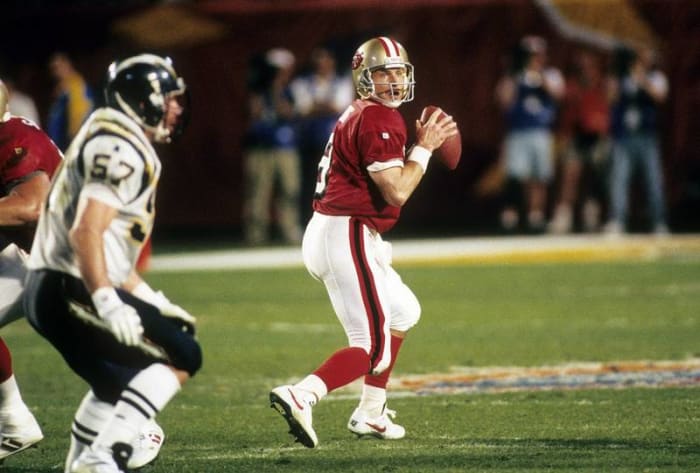
Focus On Sport/Getty Images
Steve Young stepped out from under Joe Montana’s shadow in a huge way by leading the 49ers to his only Super Bowl appearance. After leading San Francisco to touchdowns on the first two drives, Young simply could not be stopped, throwing for a record six touchdowns (tying Doug Williams for most touchdowns in a half at four) and also posting 49 rushing yards, marking the first time a player served as both top rusher and passer in the Super Bowl. His performance still hasn’t been matched in another Super Bowl.
